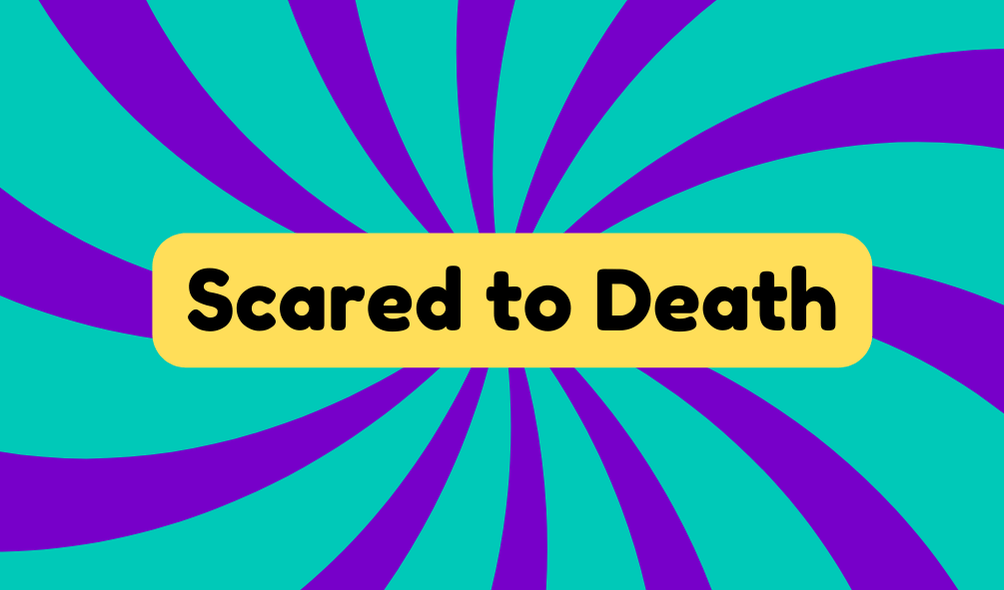The phrase "scared to death" describes an intense fear that can feel overwhelming. Its origin lies in cultural tales of life and death, first appearing in English literature in the 17th century. You might say, "I was scared to death during that horror movie." This expression highlights not only personal fear but also reflects broader societal anxieties. While it captures strong emotions, be cautious; using it lightly can undermine serious issues. Understanding the context of fear enhances communication, so if you're curious about its nuances and modern relevance, there's more to uncover.
Synonyms
When it comes to expressing the feeling of intense fright, there are several synonyms you can use that capture the essence of being "scared to death." For instance, "scared stiff" conveys a sense of being paralyzed by fear, while "panic-stricken" highlights an acute state of anxiety. Here are some more synonyms to evaluate:
- Terrified – conveys extreme fear during terrifying encounters.
- Frightened – a more general expression of fear.
- Alarmed – often implies a sudden realization of danger.
- Horrified – suggests an overwhelming emotion provoked by panic experiences.
Utilizing these words can enhance your communication, revealing different degrees of fear. Remember, each synonym offers a unique lens through which to view that intense emotion, so choose them wisely.
Example of Sentences
Being scared to death often manifests in everyday situations, leaving a lasting impression. Your emotional response to fear triggers can vary greatly, but they often lead to unforgettable moments. Here are some examples demonstrating common scenarios:
- You're alone at night and hear a noise, which scares you to death.
- You spot a sudden movement in the dark, causing a visceral emotional response of panic.
- When a loud crash interrupts your peaceful evening, you feel your heart race, scared to death.
- Seeing a horror movie might leave you scared to death, as your mind races with anticipation.
These instances show how fear can grip you unexpectedly, revealing the complexity of your emotional responses and the nature of fear triggers in daily life.
Origin
Fear has always been a powerful emotion, influencing language and culture throughout history. The phrase "scared to death" reflects its cultural significance, connecting intense fear to life-and-death situations. You might notice how this term, like many others, stems from ancient beliefs where fear often intertwined with mortality and the supernatural. Stories about people allegedly dying from fright underscore the psychological aspects of fear—this is fear psychology in action. The first documented use appeared in English literature during the 17th century. Yet, it gained traction thanks to Arthur Conan Doyle's "The Hound of the Baskervilles." So, while the phrase captures the essence of fear, it's also essential to approach its implications critically, understanding how our perceptions shape our language.
Collocations
Collocations play an essential role in expressing the intensity of being "scared to death." This phrase often pairs with nouns and verbs that amplify its emotional weight—like "hear," "see," or "feel." For instance, you might say, "I heard a loud crash and was scared to death," effectively conveying that visceral reaction. Here are four powerful collocations you might consider:
- Feel scared to death – emphasizing your internal fear response.
- See something scary – heightening the emotional triggers associated with fright.
- Hear a frightening noise – capturing the momentary panic that awakens primal instincts.
- Leave someone scared to death – illustrating the impact of fear on another person's emotions.
Using these collocations can deepen your expression of fear, engaging your audience on multiple levels.
How to Use in Everyday Language
Incorporating the phrase "scared to death" into everyday language can add a vivid touch to your conversations. Use it when describing a moment that provoked an intense emotional reaction. For example, you might say, "I was scared to death when I heard the loud crash outside." This fear expression effectively conveys your state of mind, elevating your storytelling. However, be cautious; overusing such phrases can dilute their impact. Use them selectively to maintain their emotional intensity. Also, blend "scared to death" with other fear expressions like "terrified" or "petrified" to vary your language. The goal is to engage your listeners, making them feel the same emotions you did, without overwhelming them with dramatic flair.
Why Is It Still Relevant Today?
The phrase "scared to death" remains relevant today because it succinctly captures the essence of extreme fear and anxiety in our fast-paced world. As we continuously face societal pressures—like job insecurity or personal challenges—our emotional responses intensify. This expression has a significant cultural impact, transcending generations and evolving into modern expressions that reflect our anxiety-laden reality. People still use it to convey their heightened feelings in relatable contexts, highlighting not just individual emotions but shared experiences. However, while it effectively communicates fear, it's important to recognize that casual phrases can sometimes undermine the serious nature of mental health struggles. Hence, using "scared to death" necessitates a balance between expression and understanding in today's conversations about fear and anxiety.







